“The majority of refugee aid in Poland is provided by churches. If they weren't so committed to, the aid would have collapsed long ago”, a pastor says. An article by Johannes Reimer and Manuel Böhm.
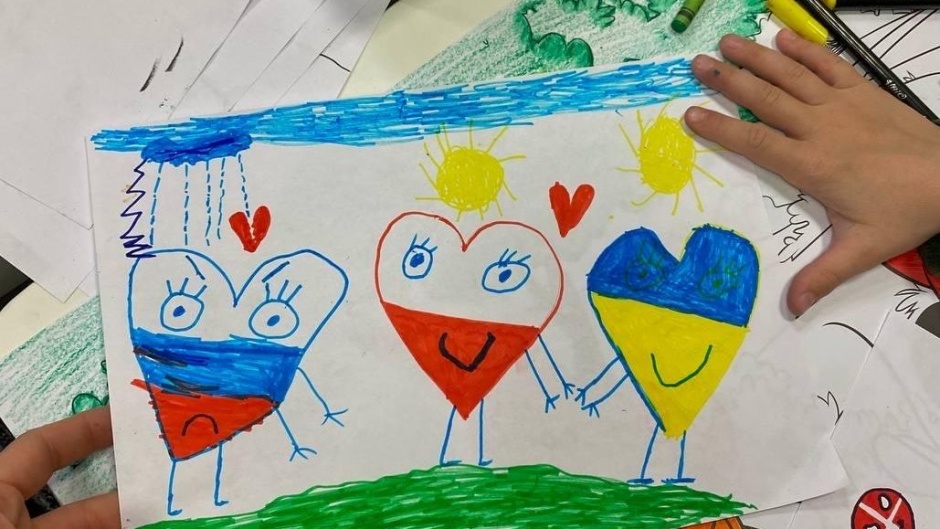
At the beginning of July, I visited Poland with a WEA staff member with the aim of getting to know a bit better the refugee work of the Slavic Protestant congregations in the country.
Among others, we met the newly married couple Natasha and Ivan. Both fled from Belarus to Poland to escape the dictates of President Lukashenko.
During their honeymoon, Natasha’s brother had received his call-up papers to the Belarusian military and therefore all their family and friends advised them not to come back.
They both discussed how to deal with this as Christians, and Ivan refused to entertain the thought of one day going to war against Ukraine. So, after the outbreak of the war against Ukraine, their honeymoon ended with them immigrating to Poland.
From day one, the young couple decided to assist the refugees from Ukraine with everything they could. They soon were involved in the work of their church in the largest arrival camp for Ukrainian refugees in looking after the children.
This wonderful work has been set up by the charismatic centre of the city of Warsaw, led by the head pastor Christof Zaremba.
Refugee children have several rooms here among the other refugees in five huge exhibition halls, with the capacity for ten thousand people each, which the volunteers have lovingly prepared for them.
They look like normal children's day cares, except that they are in a converted exhibition hall. This work with children is also led by a Belarusian. Petr worked in his home country as an English teacher and youth pastor in the church, and immediately after the outbreak of the war he felt called to come to Poland to help his brothers and sisters in Ukraine from here.
Thousands of children have come through the beautiful and child-friendly nursery in recent months, where Natasha and Ivan help out, before they set off for a new future.
"We try very hard to create a kind of living room and playroom for the children in the middle of this huge hall with tens of thousands of people", Natasha reports.
"Many of these children have experienced unspeakable horrors. Sometimes they don't speak a word to us. And as soon as they hear we are from Belarus, some of them flinch, since Belarussians also attacked them. Other volunteers have told us of children who have seen their mothers raped and sometimes even killed in front of them. Their fear of us, the Belarusians who are at Putin's side in the war, is understandable. And yet we love them and do everything to overcome their fear and we succeed with the help of God".
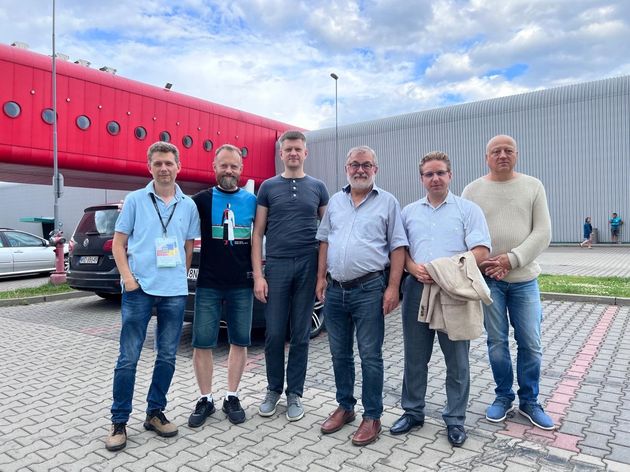
With tears in her eyes, Natasha, who worked with children with developmental disabilities in her Belarusian homeland, tells how one of the girls painted three flags in the shape of a heart, one Ukrainian, one Polish and one Russian. She added a smiley face to all the flags. On the Ukrainian and Polish flags, the faces were smiling. Only the Russian flag was adorned with a sad face.
"Why is the face on the Russian flag so sad?", Natasha wanted to know from the girl. "My heart (Russia) is broken. It doesn’t have any friends", the little girl answered sadly.
"The little girl understands, it seems to me", Ivan adds, "more than some politicians. What people need are friends and love. Even more so when the power mongers of this world set people on each other. It is neither the fault of most Russians or Belarusians that are ruled by dictators who cannot be hounded out of office under the given circumstances - nor the Ukrainians who are attacked by these power-mad people. Why should they be against each other now? In any case, we stand up for the Ukrainians because we love them and do not want our peoples to hate each other".
"Times will change and then we will need peace among ourselves. And that is why we remain friends of the Ukrainians and Russians. No, we do not support war or our dictators. We are for democracy and peace. At home, we can only achieve a little, but here, in Poland, no one is stopping us from showing solidarity with the Ukrainians".
Natasha adds: "By the way, as Christians who know that Jesus has sent us into the world, we are obliged to go into all the world and make disciples of all nations (Mt 28:19), and that also includes those who are rather unsympathetic to us because of current events. The choice is not ours, but His who sent us." One quickly notices how serious Natasha's words are.
Natasha and Ivan are far from the only Belarusians who are working to help Ukrainian refugees and whom we met in Poland.
Early in the morning we are already in one of the arrival and registration tents for Ukrainian refugees in the capital Warsaw. Again, a coach from Belarus has arrived with 60 refugees from Mariupol and the surrounding area.
The refugees tell us about their suffering in the completely bombed city, the transport to Russia and the escape from the registration camps and the many helpers on the Russian and later Belarusian side who finally helped them to get to Poland.
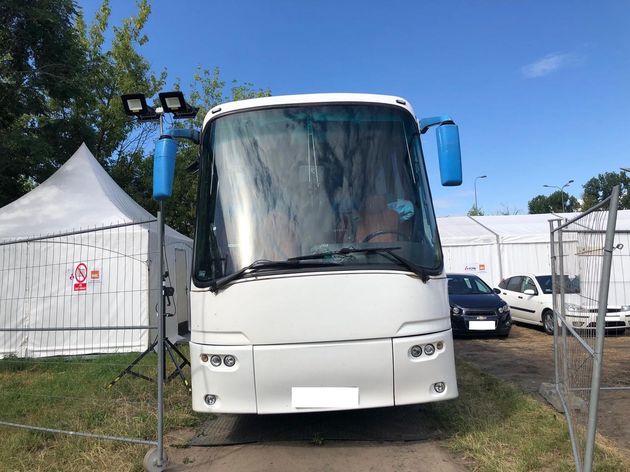
Their faces are marked by overtiredness after the long flight, but their eyes clearly show how happy they are that the escape was successful.
Andrej, a 23-year-old student, shows us photos and videos of his home, before and after its destruction. He tells us how they endured sub-zero temperatures and moments of no drinking water in cellars, only to be deported by Russians.
In the process, they were often stripped of everything, men had to undress to identify possible identifying marks of the enemy, and families like his were sometimes separated from each other on the further escape route into the few who made it here and the rest who are now being resettled in Siberia.
There, the Russians are experiencing a population decline and fear an increase in Chinese immigration. Now he is looking for hope of a new start in Norway or America, a place he had always dreamed of.
We are grateful that we too can encourage him that there are churches there, too, that will help him.
"More than 1800 refugees are reported in our tent alone, who have taken the so-called Russia-Belarus route to escape the embattled region in the Donbass", camp manager Jazek tells us.
"All the Ukrainians who fled have had a torturous journey," he says, "but those who flee via Russia, have often gone through hell. And yet, even there, there were helpers everywhere who stood by them, provided them with food, money, and everything they needed to survive. We here have known for a long time that there are also people in Russia and Belarus who are not only against the war, but who are fighting with their lives for the freedom of Ukrainians".
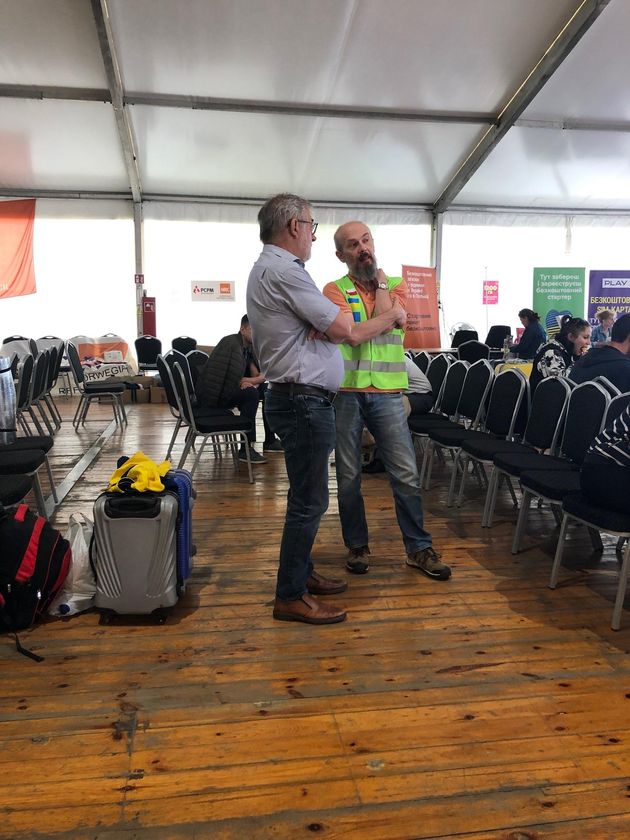
This happens at the risk of becoming victims of reprisals themselves. As a rule, these helpers are people of faith. Whole churches are now involved in helping refugees.
A family with four small children who had fled from Mariupol told us that they were accompanied by Christians at all stages of their 2000km flight. They were probably not Christians themselves, but the testimony of their helpers made a deep impression on them.
"They picked us up, put us up in flats, took care of us and always encouraged us not to lose courage. And so, we travelled for several weeks. Now, finally, we have arrived in safety. But our helpers want to go back and pick up the next group".
The woman we are talking to points gratefully in the direction of Eduard, the Belarusian bus driver, who has fallen asleep next to us on the hard chairs. He has already come to Warsaw 28 times with his coach full of refugees.
"The authorities let us through, and as long as they do, we should act too". he told us before tiredness completely overcame him. He and his helpers wanted to return the same day. There are already others waiting for us in the churches of our city.
On the same day, we drive to the Russian-speaking Baptist church in the centre of Warsaw. Michail Buloha, a pastor from Ukraine with Hungarian roots, has been leading the congregation here for six years.
Until the war, it was mainly Russian-speaking guest workers who joined his congregation, but now it is refugees from Ukraine and Belarus. The Sunday service has grown to 600 visitors.
"We make no distinction here between Ukrainians, Belarusians or even Russians. All people in need receive our help. Since the war began, the congregation has cared for more than 15,000 refugees".
"Every day, up to 200 families receive basic food, hygiene items, medicine, and a hot meal. The donations for this mainly come from the population and the church itself. And the church is also committed to providing psychological care for the people. With the help of the Peace and Reconciliation Network, staff have been trained in trauma care and so anyone who seeks help, can get help".
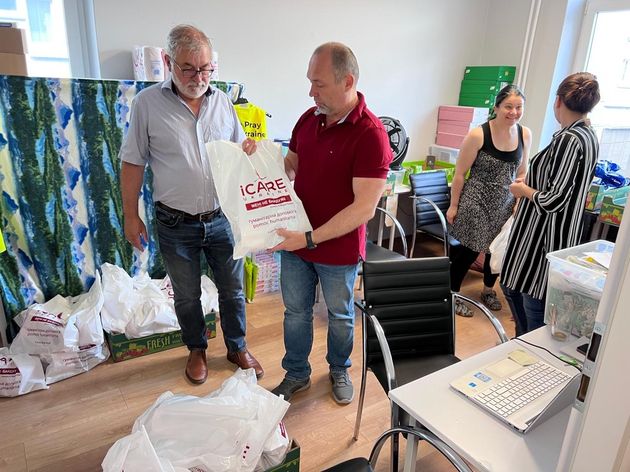
One notices a touch of pride in the busy clergyman that this enormous achievement was started without foreign donations. Only recently have they been supported by the American Eurasia-Mission.
Pastor Buloha is responsible for the Russian-speaking congregations in the Polish Baptist Union. Seventeen of these congregations exist in Poland and all of them follow the example of the central congregation in Warsaw and work intensively for the Ukrainian refugees.
"We are even in the process of establishing new congregations in seven places", he tells us, not without joy.
On the same day we are meeting, he plans to travel to Lodz, where another congregation is to be opened on the next Sunday. Many of these congregations are experiencing growth through refugees who are finding a new home there.
This is also the case in a congregation where Dan is involved as a missionary of the Southern Baptist Mission from America under the leadership of Pastor Buloha. In his congregation, Poles, Ukrainians, and some Russians live under one roof – a house of reconciliation.
In addition to the social work, Buloha also refers to the children's camps that the church offers for the refugee children. Several of these camps are currently running. "It is mainly children who suffer unspeakably from the situation", he says.
"Often it is mothers with children who arrive here, having had to leave their husbands behind in Ukraine who defend the country. The parents often already work hard to earn their own money. With our camps, we take some of the burden off the mothers and contribute to the psychological recovery of the traumatised children".
To our astonishment, we again meet several Belarusians at these camps who are dedicated to the children.
The camp director tells us: "At the moment, it is mainly our Ukrainian friends who are suffering under the burden of war, flight and the loss of their homeland. All our attention goes to them. We do not forget those who have fled the dictators in Russia and Belarus. They too need friends, and we offer our hand of friendship to all people. This is what Jesus would have done, and this is what we do".
Baptists are not the only ones in Poland providing large-scale refugee aid. We are told of Pentecostal and Brethren congregations, Protestant and Catholic parishes that are similarly active.
Buloha once again confirms: "The majority of refugee aid in Poland is provided by the churches. If they weren't so committed to the people, the aid would have collapsed long ago".
To our question about what is urgently needed, Pastor Buloha answers: "We urgently need rooms. Our congregations are crowded into a few square metres in rented rooms. If we had rooms, our care could be intensified several times over. And then we need housing for the refugees, and work".
He mentions other bottlenecks and then talks about the urgent need for children's literature in Ukrainian. When we show him the children's books produced by PRN and the Good Books publishing house in Ukraine, his heart swells. "We need these books here and better today than tomorrow".
"During the months of the war, we, the Russian-speaking communities in Poland, experienced one miracle after another. If someone had told me that all that we have been allowed to do up to now and would be done by us, I would have dismissed it as fantasy. And yet that is exactly what it has all become. Don't ask me how. God alone knows how miracles work. In the end, we ourselves have benefited most spiritually from all this work. Our faith has grown and God's presence among us has become more real than ever before".
We heard that working with supporters from abroad is highly valued, but often difficult for our brothers and sisters to manage. "We don't have time to fill out these reports and needs lists", the American missionary from Eurasia-Mission tells us.
Better networking and further support are needed, but it seems that what is needed is for us too to get out more, visit and look and listen ourselves what is needed – and then not stop supporting the brothers and sisters who are giving all they are and have.
Even in a new home not quite at home, they help those who are sad and need our help.
Johannes Reimer is professor of Mission Studies and Intercultural Theology and Director of the department of Public Engagement of the World Evangelical Alliance (WEA).
Manuel Böhm is MA Head of the WEA Support Fund for Ukraine..

Las opiniones vertidas por nuestros colaboradores se realizan a nivel personal, pudiendo coincidir o no con la postura de la dirección de Protestante Digital.
Si quieres comentar o